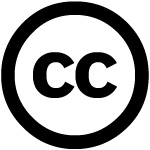您可自由:
- 分享 — 重製、散布及傳輸本著作
- 重混 — 修改本著作
惟需遵照下列條件:
-
姓名標示 — 您必須按照著作人或授權人所指定的方式,表彰其姓名(但不得以任何方式暗示其為您或您使用本著作的方式背書)。
所謂的「姓名標示」是什麼意思?引領你前來此處的網頁中嵌入了含授權資訊的後設資料,包括原作者想以什麼方式為人表彰等。你可以使用此處提供的 HTML 來引用此作品、並表彰出處。這麼一來,你的網頁上也會有授權後設資料,方便他人尋得原始作品。 -
相同方式分享 — 若您變更、變形或修改本著作,您僅得依本授權條款或與本授權條款類似者來散布該衍生作品。
且認知到:
- 免除 — 若您得到著作權人的同意,上述任何條件都可獲免除。
- 公共領域 — 當本著作或其任何要素在相關法律下屬公共領域,此狀態絕不會受到本授權條款的影響。
- 其他權利 — 任何下列的權利絕不會受到本授權條款的影響:
- 聲明 — 為了再使用或散布之目的,您必須向他人清楚說明本著作所適用的授權條款。提供本網頁連結是最好的方式。
CC licenses anticipate that a licensor may want to waive compliance with a specific condition, such as attribution.
A work is in the public domain when it is free for use by anyone for any purpose without restriction under copyright.
All jurisdictions allow some limited uses of copyrighted material without permission. CC licenses do not affect the rights of users under those copyright limitations and exceptions, such as fair use and fair dealing where applicable.
In addition to the right of licensors to request removal of their name from the work when used in a derivative or collective they don't like, copyright laws in most jurisdictions around the world (with the notable exception of the US except in very limited circumstances) grant creators "moral rights" which may provide some redress if a derivative work represents a "derogatory treatment" of the licensor's work.
Publicity rights allow individuals to control how their voice, image or likeness is used for commercial purposes in public. If a CC-licensed work includes the voice or image of anyone other than the licensor, a user of the work may need to get permission from those individuals before using the work for commercial purposes.


